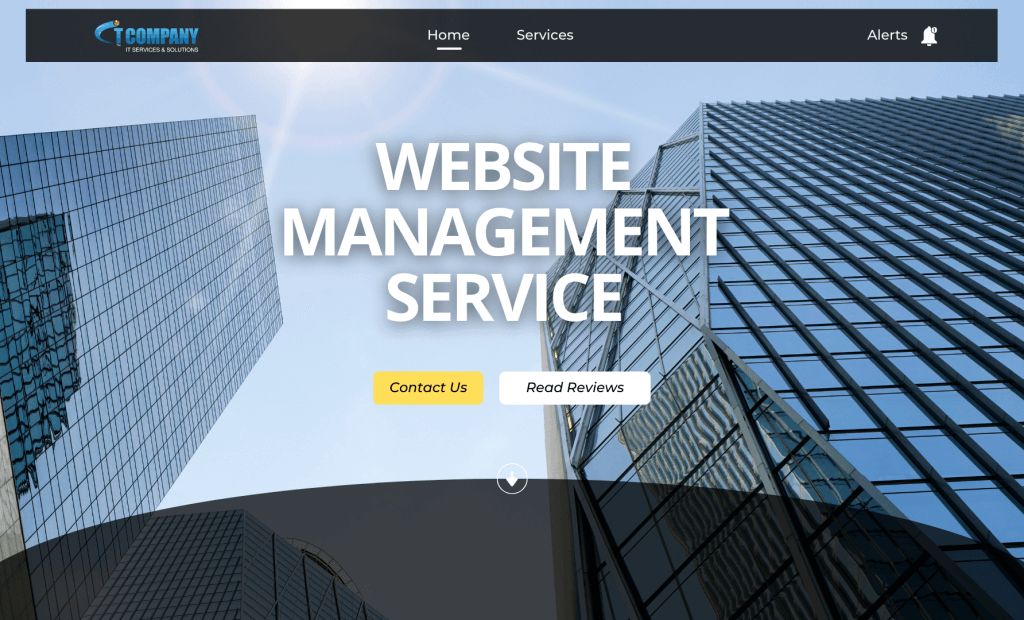
Table of Contents
ToggleWhether you own a small business or a major organisation, your website is one of your most valuable assets. It might be difficult to get the most out of your site if it is not well-managed.
In fact, 88% of customers are unlikely to return to a website after a negative encounter. In this post, you’ll explore what website management is, why it’s vital, and how to create your own management strategy to propel your business forward in the coming year.
Understanding Website management
Website management is the process of maintaining and improving a website once it has been designed to ensure that it is safe and fully functioning. This method relates to the design, structure, content, functionality, and promotion of the website.

Website management is crucial since a badly managed website is likely to be sluggish, clumsy, obsolete, or even insecure. Let’s take a closer look at why website management is so important:
- User Experience: According to a multinational market research firm, every dollar invested in user experience (UX) generates a $100 return on investment. Effective website management may assist guarantee that a website is visually appealing and gives an enjoyable user experience. This can keep visitors engaged and urge them to participate.
- Technical performance: According to an Adobe report, 41% of users will quit watching a website that takes too long to load. Proper website management may assist to guarantee that a website runs smoothly and is accessible to visitors. This may entail resolving technical issues like broken links and loading failures.
- Security: Website management may also entail putting in place safeguards to protect the website and its users from security risks such as malware and hacking attempts.
- Brand reputation: A poorly managed website may reflect negatively on a company or organisation, harming its reputation and perhaps losing clients.
6 Key Easy Steps to Perform Website Management
Most company owners may relate: we work hard and want to spend our time doing what we like. However, managing our websites is simply another task on our to-do list that never gets completed. If you’re having trouble with website maintenance, don’t worry—you don’t need to be an expert as IT Company can provide you this service.

1. Select a content management platform
A content management system (CMS) enables users to produce, publish, and update digital material on a website. A great CMS simplifies website management from the start by providing a user-friendly interface for managing and organising website content.
Moreover your CMS will contain options ranging from simple to more complicated website layouts, allowing you to quickly get your site up and running. You may also choose whether to create a static or dynamic website.
2. Back up your website
Website backup is the process of making a duplicate of a website’s files and data and storing it in a different location.
There are several methods for backing up a website, including manually downloading the website’s files or utilising a backup service offered by the website’s hosting firm.
Regularly backing up a website is crucial to enable restoration in case of issues. The frequency of backups depends on how often the website’s content updates and its importance to the business.
03. Secure your website
Take proactive actions to safeguard your website, which is an important component of successful online management. By strengthening your website, you protect your small business and its customers against potential cyber dangers like malware and hacking attempts.
For small companies, website security is critical to retaining confidence and protecting sensitive data. Choose a reputable hosting company, such as IT Company, which is known for its strong security measures, industry certifications, and 24-hour customer assistance.
- Improved cybersecurity prevents disruptions in corporate operations.
- Trust and credibility are strengthened, increasing consumer confidence and loyalty.
- Having access to experienced help means that security issues are resolved quickly, reducing downtime and potential losses.
04. Monitor your website
Monitor your website actively to ensure its optimal health and performance. This crucial step in website maintenance allows you to prioritize urgent management tasks effectively.

For small businesses, this means staying ahead in the digital landscape and maximizing online presence. Here’s how:
- Utilize analytics tools like Google Analytics to track website traffic and performance metrics.
- Regularly inspect all web pages to ensure seamless functionality.
- Update plugins promptly to prevent user experience disruptions.
05. Refresh your Website design
An outdated website design can drive potential customers away, increasing the likelihood of them choosing a competitor with a modern site. Research shows that 38% of visitors abandon unattractive websites. Continuously refreshing your website design retains visitors, boosting conversion rates.
Similarly, maintaining fresh and relevant content is crucial. Ensure your site’s content remains current to sustain visitor engagement. Consider implementing redirects when necessary, and opt for a user-friendly website builder to simplify content optimization and refresh processes.
- Reduced bounce rates and increased visitor retention
- Improved conversion rates through enhanced user experience
- Streamlined web management for efficient updates and optimization
6. Promote Your Website
Marketing is vital in website management because it allows you to control your content and communicate with clients in the ways that they prefer. Website marketing may also be used to personalise user experiences by presenting them with material that is relevant to their interests.
Website marketing when implemented appropriately has been demonstrated to improve business traffic and sales. It also improves their websites’ ability to convert visitors into customers by offering a personalised experience that is tailored to their specific demands. Here are a few effective marketing methods for website management.
- Use search engine optimisation (SEO) best practices on your website to increase traffic.
- Send email campaigns to your contact list to keep them in the loop.
- Run a referral programme with rewards for clients who send you new business.
- Create sponsored advertisements for Google, Facebook, Instagram, and other social media sites.

Impact of Regular Content Updates
Regularly updating website content is crucial for maintaining relevance and engagement. It involves refreshing information, adding new features, and optimizing for better user experience.
Small businesses can leverage content updates to stay competitive, attract visitors, and foster customer loyalty.
- Improved search engine visibility through fresh content
- Enhanced user engagement and retention with updated information
- Opportunity to showcase latest products, services, or promotions to attract new customers
Unlocking the Potential of WordPress & Plugin Updates
Ensure your WordPress website remains secure and efficient by regularly updating both the core WordPress software and its plugins. Keeping your website up to date minimizes vulnerabilities and ensures optimal performance.
For small businesses, staying current with WordPress and plugin updates is crucial to maintaining a safe and functional online presence. By regularly updating, businesses can:
- Enhance website security and protect against cyber threats
- Improve website performance and user experience
- Access new features and functionalities to stay competitive in the online market
Ensuring Business Continuity with Website Backup
Website backup ensures the safety of your digital assets. It involves duplicating and storing website data to guard against loss due to cyberattacks, errors, or server failures.
For small businesses, website backup is vital, preserving critical information and maintaining online presence. Utilize reliable backup solutions like Cloud Backup Inc., offering automated backups, easy restoration, and customizable scheduling.
Benefits:
- Continuous protection of website data against unforeseen incidents
- Quick recovery options to minimize downtime and maintain business continuity
How much does managing a website cost?
Website maintenance expenses vary based on the complexity and scale of your website, the sort of material you have, and your company’s special requirements. However, there are certain typical elements that might affect the cost:

- Domain and hosting: Domain names typically cost between $0 and $20 per year, while web hosting can range from $0 to $200 per month, depending on your web hosting provider.
- SSL certificate: To protect the security of your website, you must obtain an SSL certificate. This can be free, like with an IT Company website, or up to $27 to 198$ per year.
- Website design: If you want to update your website design or add new features, a freelance web design company may charge between $20 and $100 per page.
- Content development costs anywhere from $50 to $500 or more each item, depending on the complexity and quality necessary.
- Marketing and advertising: Depending on whether you’re promoting your website SEO, Pay-Per-Click advertising, social media marketing, or another way, the charges will vary.
- e-commerce features: If your website sells online, you may include additional expenses for payment gateways and inventory management systems.
Conclusion
In conclusion, proactive web maintenance is critical in ensuring a successful digital presence. Businesses that prioritise regular maintenance may provide the best possible user experience, technical performance, and security.
IT Company provides complete website maintenance services, such as backup solutions and technical support. Invest in website maintenance to protect your digital assets to maintain customer trust and drive business growth.
FAQ’s
What is website management and why is it crucial?
How can website management benefit small businesses?
2. Improved technical performance: This ensures that the site runs smoothly and is easily accessible to users, lowering bounce rates.
3. Stronger security: Protects against cyber dangers such as malware and hacking attempts, while retaining trust and confidence.
How can marketing contribute to website management?
2. Send email campaigns to engage and keep customers informed.
3. Run referral programmes to encourage client recommendations and accelerate business growth.
4. Create sponsored ads across many channels to reach a larger audience.